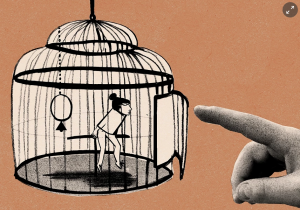From sacred ritual to declining institution, wedlock has always reflected our ideas about liberty and commitment.
October 26, 2023
Marriage is in decline in almost every part of the world. In the U.S., the marriage rate is roughly six per 1,000 people, a fall of nearly 60% since the 1970s. But this is still high compared with most of the highly developed countries in the Organization for Economic Cooperation and Development, where the average marriage rate has dropped below four per 1,000. Modern vie

THOMAS FUCHS
ws on marriage are sharply divided: In a recent poll, two in five young adult Americans said that the institution has outlived its usefulness.
The earliest civilizations had no such thoughts. Marriage was an inseparable part of the religious and secular life of society. In Mesopotamian mythology, the first marriage was the heavenly union between Innana/Ishtar, the goddess of war and love, and her human lover, the shepherd Dumuzi. Each year, the high point of the religious calendar was the symbolic re-enactment of the Sacred Marriage Rite by the king and the high priestess of the city.
Throughout the ancient world, marriage placed extra constraints on women while allowing polygamy for men. The first major change to the institution took place in ancient Greece. A marriage between one man and one woman, with no others involved, became the bedrock of democratic states. According to Athenian law, only the son of two married citizens could inherit the rights of citizenship. The change altered the definition of marriage to give it a civic purpose, although women’s subordination remained unchanged.
At the end of the 1st century B.C., Augustus Caesar, the founder of the Roman Empire, tried to use the law to reinvigorate “traditional” marriage values. But it was the Stoic philosophers who had the greatest impact on ideas about marriage, teaching that its purpose included personal fulfillment. The 1st-century philosopher Musonius Rufus argued that love and companionship weren’t just incidental benefits but major purposes of marriage.
The early Church’s general hostility toward sex did away with such views. Matrimony was considered less desirable than celibacy; priests didn’t start officiating at wedding ceremonies until the 800s. On the other hand, during the 12th century the Catholic Church made marriage one of the seven unbreakable sacraments. In the 16th century, its intransigence on divorce resulted in King Henry VIII establishing the Anglican Church so he could leave Catherine of Aragon and marry Anne Boleyn.
In the U.S. after the Civil War, thousands of former slaves applied for marriage certificates from the Freedmen’s Bureau. Concurrently, between 1867 and 1886, there were 328,716 divorces among all Americans. The simultaneous moves by some to escape the bonds of matrimony, and by others to have the right to claim it, highlight the institution’s peculiar place in our ideas of individual liberty.
In 1920, female suffrage transformed the nature of marriage yet again, implicitly recognizing the right of wives to a separate legal identity. Still, the institution survived and even thrived. At the height of World War II in 1942, weddings were up 83% from the previous decade.
Though marriage symbolizes stability, its meaning is unstable. It doesn’t date or fall behind; for better or worse, it simply reflects who we are.







